A legal and advocacy organisation, Socio-Economic Rights and Accountability Project (SERAP) has invoked the Freedom of Information (FoI) law to demand the publication of completed public hearings and corruption probes since 1999 from the National Assembly.
In a statement issued by SERAP Sunday morning, the organisation asked the Senate President, Dr. Ahmad Lawan and his counterpart at the House of Representatives, Rt. Hon. Femi Gbajabiamila “to tell Nigerians the number of probes that have resulted in indictment of suspects, name the suspects & send reports to anti-corruption agencies”.
SERAP in its FoI request stated that: “We urge you to sponsor a resolution to stop lawmakers from directly getting involved in the execution of projects by MDAs to ensure the proper and effective exercise of oversight functions, in cases such as the NDDC and NSITF public hearings & probes.
“We also urge you to use the opportunity of the ongoing corruption probes to influence Nigeria’s anti-corruption agenda, including by immediately amending section 52 of the ICPC Act, to expand & strengthen the powers of independent counsel to prosecute grand corruption cases”, SERAP said.
Meanwhile, there seems to be more trouble for the Management of the Niger Delta Development Commission (NDDC) at the House of Representatives on the strength of queries by the Auditor General of the Federation over certain expenditures at the interventionist agency.
The ongoing probe of the activities of the commission by an ad-hoc committee of the House has already exposed many alleged shady deals at the commission, which has triggered the anger of many Nigerians calling for a decisive action to punish anyone found culpable in the alleged multi-billion Naira embezzlement.
According to a report from the office of the Auditor General of the Federation (AuGF) to the House Committee on Public Accounts on the finances of the commission, more damning revelations was reported to be coming.
The embattled leadership of the NDDC is opposed to call by the National Assembly that the commission be returned to the Presidency for supervision as was the case in the past.
The AuGF’s report on NDDC covering the period 2008 to 2012 raised questions over extra budgetary expenditure, award of emergency contracts and paying for unexecuted contracts.
While responding to the questions raised, the commission only stated that the resort to the award of emergency contracts was to ensure that peace prevailed in the regime, and that there was no way it could identify projects such as roads and other infrastructures which might need emergency attention.
Some of the queries by the AuGF are:
Payment of N199.5 million by the commission for the supply of school desks in Delta State.
It said that there was no evidence that desks were supplied to schools in Ethiope West, Warri North, Isoko North, Sapele and Warri South local government areas of Delta despite payment to the contractors.
The use of unbudgeted contracts, which the Commission explained that “as an interventionist agency it is mandated to intervene in critical areas.’
The commission added that: “the project was awarded under a global budget emergency repairs, Corporate Social Responsibility and strategic access road… It is not feasible to determine roads, bridges or other infrastructure that may require our urgent attention.
On alleged non-deduction of VAT from recently completed contracts for which mobilisation payments were made before 2008.
The value of the contacts was put at N936.77 million.
The Commission said “VAT is a tax burden to the commission and hence VAT due to contractors and consultants on projects, supplies and other services are calculated and paid to the relevant tax authority at the end of each month. It is not a deduction from contractor’s bill unless specified in the bill of quantity or suppliers invoice. It is an addition to project cost and hence, overpayment to contractors will not arise in any way because of VAT”.
Again, the Auditor General observed what it called “unrecognized oil company’s contributions into final account N3.280 billion”, to which the Commission said “all contributions received from oil companies were paid directly into our Union Bank Account in Port Harcourt and the Off shore account in the United Kingdom and in recent years, a few were remitted into the First Bank account in Port Harcourt and the offshore account in the United Kingdom… the process of ascertaining the actual companies that made contributions into these banks could be difficult sometimes due to insufficient information which could, in few cases, lead to wrong posting.”
However, while the audit query stated it identified tax deduction on payment vouchers without evidence of remittance of N10,027,330,926.17, the commission insisted that “we have remitted all taxes to the appropriate authority.
Also of concern was multiple contract awards and payment of mobilisation detected, but the NDDC management said it was looking into this with a view to relocating one of the contractors to another site, but the mobilisation paid is safe since they are backed by bank guarantees.
The AuGF accused the commission of making unauthorised transfer of funds to the personal account of some individuals as well as some undisclosed accounts, stating that the sum of N40 million was transferred by the commission to the personal account of a former director.
Also the sum of N87, 331,331.11 was reported to have been transferred from Access Bank account of the Commission to an undisclosed account.
In an attempt at explaining the alleged illegal transfer, the commission did not address the issue raised, it only stated that “the balance arose from the domiciliary account opened at the early stage of the commission to pay contractors and other payables”.
Meanwhile, NDDC has kicked against the the National Assembly’s recommendations that prayed for the return of the commission to the supervision of the Presidency.
NDDC’s Acting Executive Director, Projects, Dr. Cairo Ojougboh, was reported to have said that the activities of some national lawmakers were constituting a stumbling block to the operations of the commission and should be critically examined for the country to move forward.
By Tobiloba Kolawole






